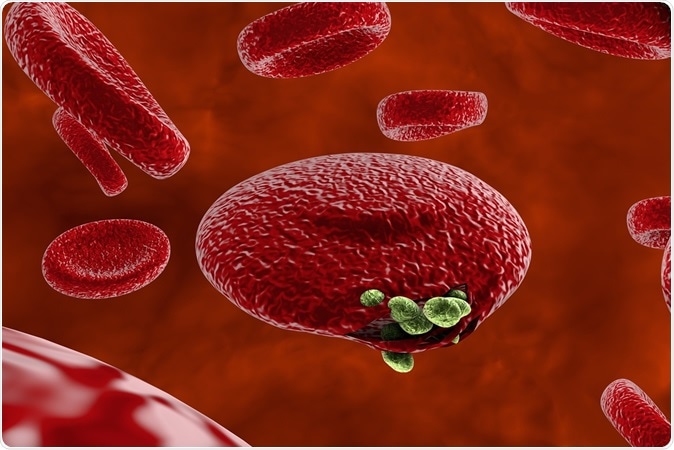It is already known that dogs with their sharp noses can sniff out a host of human diseases including cancers.
A new study has now shown that dogs could possibly detect and diagnose a person suffering from malaria. Clues from this technology is now helping scientists to develop an accurate diagnostic technology that can detect the dreaded parasitic infection that kills thousands each year.

Malaria. Release of malaria parasites from red blood cell. Image Credit: Kateryna Kon / Shutterstock
Researchers explain that in patients with epilepsy, those with early stages of cancer and those who suffer from fluctuations of blood sugar levels, there is an alteration in the smell of the urine, sweat and breath. This minute change is often detected by the sharp noses of trained dogs.
Malaria is a parasitic infection caused by Plasmodium species and can be detected by blood tests. It kills thousands yearly and there are no rapid non-invasive tests at present to detect the infection that causes high fevers with chills and may cause serious complications and even death if not treated adequately. According to public health entomologist Steven Lindsay from Durham University, developing technology that harness the principles of a dog’s nose to detect malaria could help develop and simple non-invasive test to detect malaria.
Dr. Lindsay explains that people with malaria often produce a “distinct odour in their breath”. It is speculated that the mosquitoes can detect the presence of the parasites in a human and bite them to help spread the infection as they bite another healthy person. They scientists speculated that dogs too have top notch smelling systems and it is likely that they may also be able to detect these parasites in the humans thorough these distinctive smells.
Can dogs detect malaria
Professor Lindsay presented the results of his research at the American Society of Tropical Medicine and Hygiene annual meeting this week at New Orleans and found that dogs (a Labrador and a Labrador-retriever cross breed) who were trained to smell out the malaria parasites from children’s worn socks were successful in sniffing out the parasite.
They were correct in detecting an individual with the infection 70 percent of the time and were also correct in detecting is a person did not have the infection 90 percent of the time. Both being right about the infection or about the infection-free status are with high accuracy.
Lindsay explained that the children of Gambia who participated in the study were provided with nylon socks to be worn overnight. The samples of these socks were then sent in air sealed packages to UK for identification of the smells by the trained dogs.
According to the team of researchers, this is just a “proof of concept” stage of the study but it is a first step to find an alternative to blood tests. Each year hundreds of thousands of blood tests are conducted to detect malaria in the infected as well as non-infected individuals.
According to Professor Lindsay, may be using this technique the dogs could sniff out malaria patients in large crowds as well. He added that the teams would work along with the national malaria control programs of various nations to develop safer and non-invasive alternatives to diagnosis. He said that the next step could be to develop chemical detectors that could detect malaria from odour markers.
Source: https://www.abstractsonline.com/pp8/#!/4692/presentation/17373 and https://www.medicaldetectiondogs.org.uk